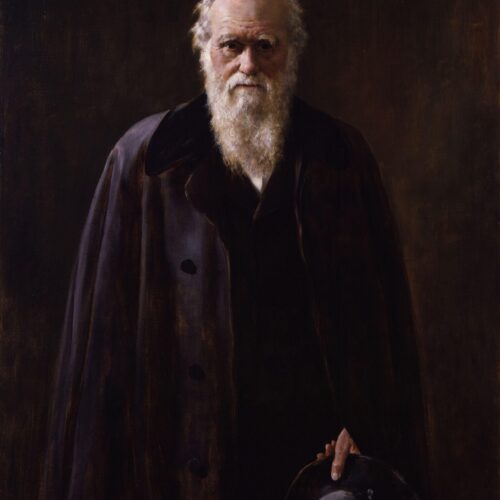

I cannot pretend to throw the least light on such abstruse problems. The mystery of the beginning of all things is insoluble by us; and I for one must be content to remain an Agnostic.
Charles Darwin, Autobiography (1876)
Charles Darwin remains one of history’s most notable scientists, whose work helped to usher in a radically new understanding of human life. As the founder of evolutionary biology, Darwin profoundly changed the way people saw the world, understood the past, and made sense of humanity itself, shaking the foundations of Christian thought on creation and morality. With the publication of On the Origin of Species in 1859, Darwin laid out the concepts of evolution by natural selection, establishing a discipline which would help shape modern science, and ripple through the thinking of Victorian society. These theories lent weight to the existing agnosticism of many, and exemplified a humanist faith in science and reason.
Thus disbelief crept over me at a very slow rate, but was at last complete. The rate was so slow that I felt no distress, and have never since doubted even for a single second that my conclusion was correct. I can indeed hardly see how anyone ought to wish Christianity to be true; for if so the plain language of the text seems to show that the men who do not believe, and this would include my Father, Brother and almost all my best friends, will be everlastingly punished. And this is a damnable doctrine.
Charles Darwin, Autobiography (1876)
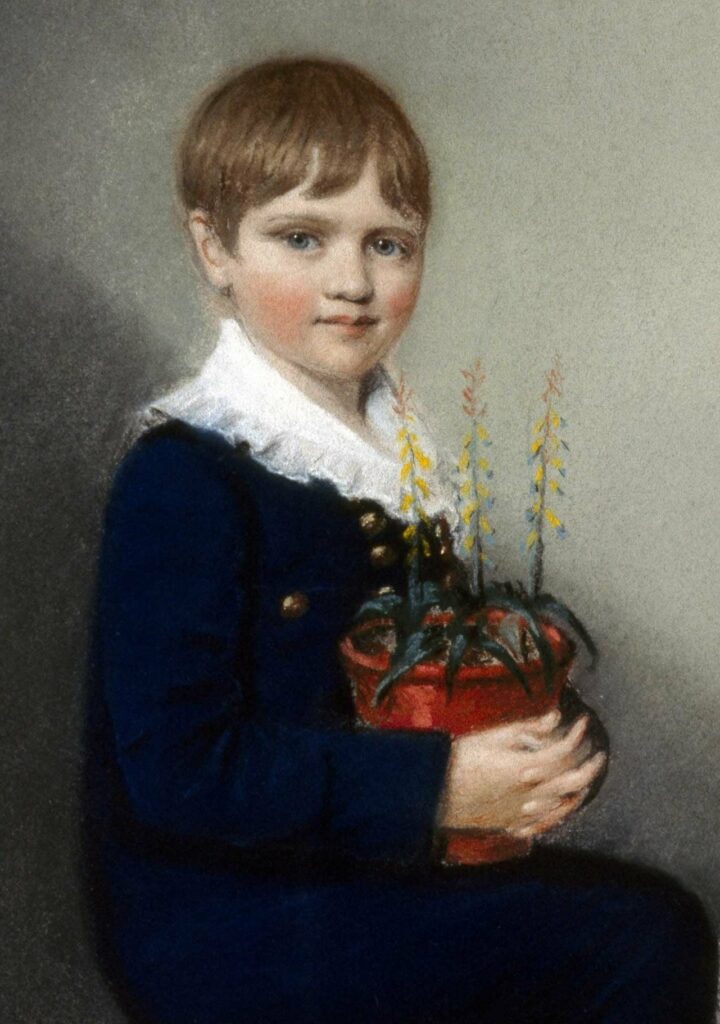
Charles Darwin was born in Shrewsbury, Shropshire on 12 February 1809, the fifth child of Dr. Robert Waring Darwin and Susannah Wedgewood. Darwin was enthused by his father’s medical observations, which helped teach him about human psychology, and took early to the solitary walks which became a lifelong pastime. Although passionately curious, Darwin did not excel within the rigid classical curriculum of Shrewsbury School. He read Shakespeare and was fascinated by chemistry, but was reprimanded by his headmaster for time wasting with the latter.
Brothers Charles and Erasmus Darwin both went to Edinburgh University, where three generations of Darwins had received medical training. Edinburgh, home to religious dissenters unable to take degrees at Oxford and Cambridge, exposed Darwin both to freethinkers and new sciences: he studied chemistry, learned taxidermy, and joined the Plinian Society, for students interested in natural history. However, he left Edinburgh without a degree in 1827, and went to Cambridge University, studying – on the advice of his father – to become a clergyman. Two years later, radical freethinkers Richard Carlile and the Reverend Robert Taylor (the ‘Devil’s Chaplain’), began an ‘infidel home missionary tour’ from Cambridge, and were run out of town. Darwin, whose own religious convictions were already uncertain, could have been left in no doubt about the risks of heretical opinion.
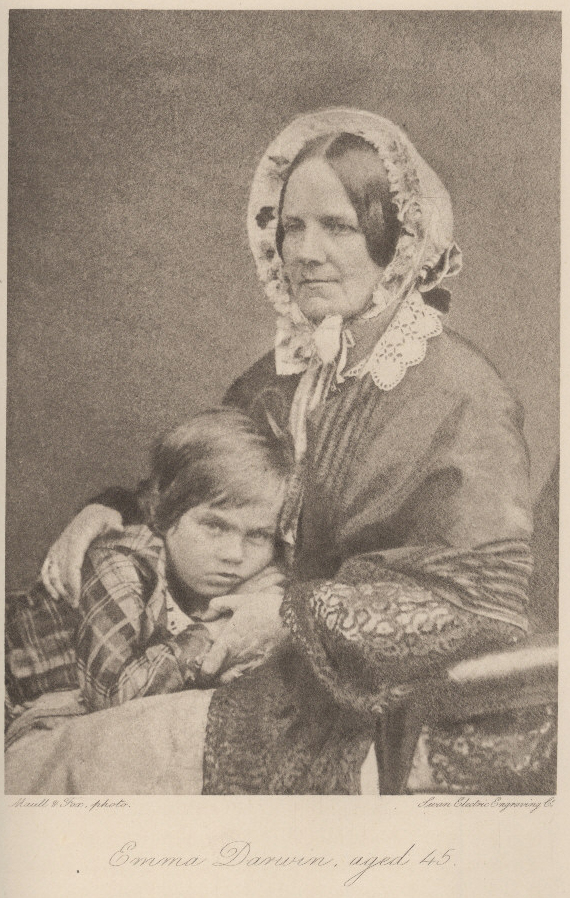
Darwin had an eye for hypothesis and an increasing fascination with botany and entomology. He grew to idolise John Stevens Henslow, a young botany professor who became his mentor, and ultimately recommended Darwin to Robert FitzRoy: captain of HMS Beagle. The five year expedition embarked on 27 December 1831, intending to survey the coast of South America. For Darwin, the trip was career-defining, cementing his ambitions in natural history and enabling the rapid accumulation of natural specimens for further study back home.
The voyage of the Beagle pushed Darwin to think more like his old classmates at Edinburgh about origins, changes, and causes. This early evolutionist thinking was later developed in 1837, when his study on the Galapagos finches demonstrated that the different islands held different species of the birds. His shift towards evolution (or ‘descent’) was in direct contradiction to what he had been taught at Cambridge, where William Paley’s theories on a designer god were a cornerstone of scientific teaching. From the late 1830s, Darwin came to progressively reject notions of design and divine revelation. He was open about his beliefs with his cousin, Emma Wedgwood, who he married in 1839, in spite of her own religious devoutness.
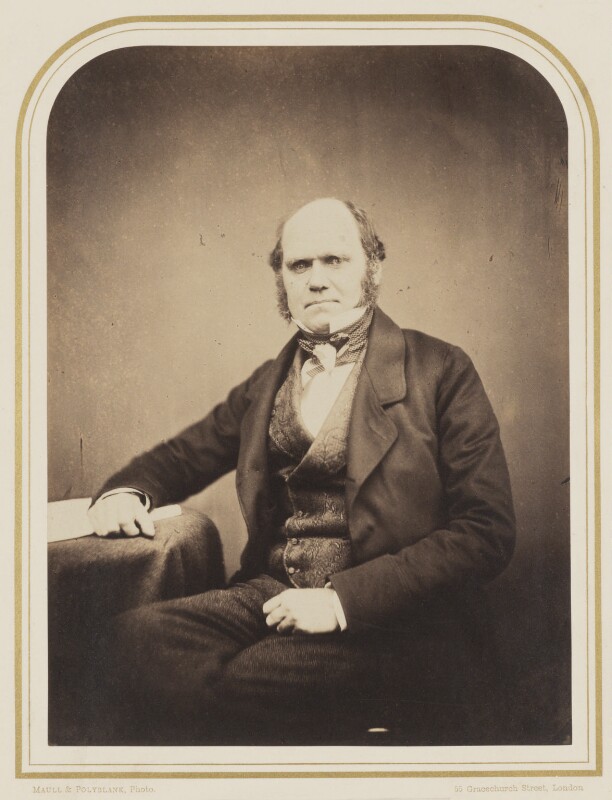
By the middle of the century, Darwin had radically broken away from creationism and natural theology. Before moving from London to Kent in 1842, Darwin had sketched his theory of evolution, but without intent to publish, fearing the effect on his relationships and reputation. His other publications, however, cemented his place as an authoritative geologist and zoologist. In 1853, Darwin met T.H. Huxley, part of a secularist, scientific network in London, which also included Herbert Spencer. He worked assiduously, through the study of seed transportation and selective breeding, to disprove generally held assumptions which might be used to challenge his evolutionary theories. In 1856, he began to write with publication in mind, battling sickness and ill health throughout.
1859 saw the publication of On the Origin of Species by Means of Natural Selection, or, The Preservation of Favoured Races in the Struggle for Life, which elaborated the ideas of evolution by natural selection. His work was considered extremely radical by many, to moderate which responses often focused heavily on his observational skills and careful method, rather than on the veracity and implications of his theories. Despite publishing the Origin, Darwin had yet to publicly declare his views on human evolution. This did not happen until The Descent of Man, and Selection in Relation to Sex (1871), and The Expression of the Emotions in Man and Animals (1872). These two pieces of work applied the theory of evolution to humans and further developed the natural selection theory.
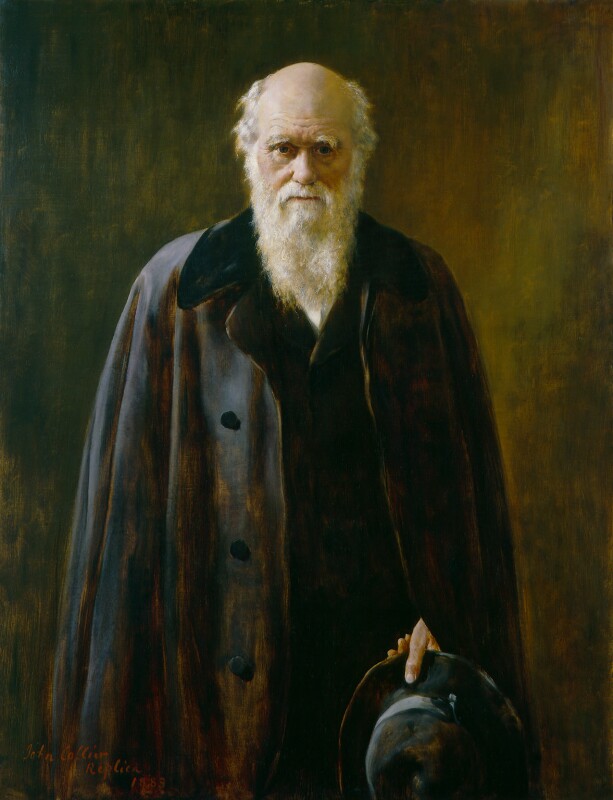
Towards the end of his life, Darwin wrote his autobiography (for the private reading of his grandchildren), and stated his rejection of Christian myths such as eternal torment. Though describing himself as agnostic, Darwin retained a lifelong hesitancy to assert his religious position. His champions (notably Huxley) took up the defence of his theories against theological attack, which Darwin allowed, frequently plagued by severe sickness and desirous not to offend. In 1880, he wrote to Edward Aveling that:
though I am a strong advocate for free thought on all subjects… it appears to me (whether rightly or wrongly) that direct arguments against christianity & theism produce hardly any effect on the public; & freedom of thought is best promoted by the gradual illumination of men’s minds, which follow[s] from the advance of science.
On 19 April 1882 Darwin died at Down House, at the age of 73. He was later buried in Westminster Abbey, among (as The Standard recorded) ‘the illustrious dead who make that noble fane unrivalled in the world’.
For myself, I do not believe that there ever has been any revelation. As for a future life, every man must judge for himself between conflicting vague probabilities.
Charles Darwin, letter to a German student, 1879
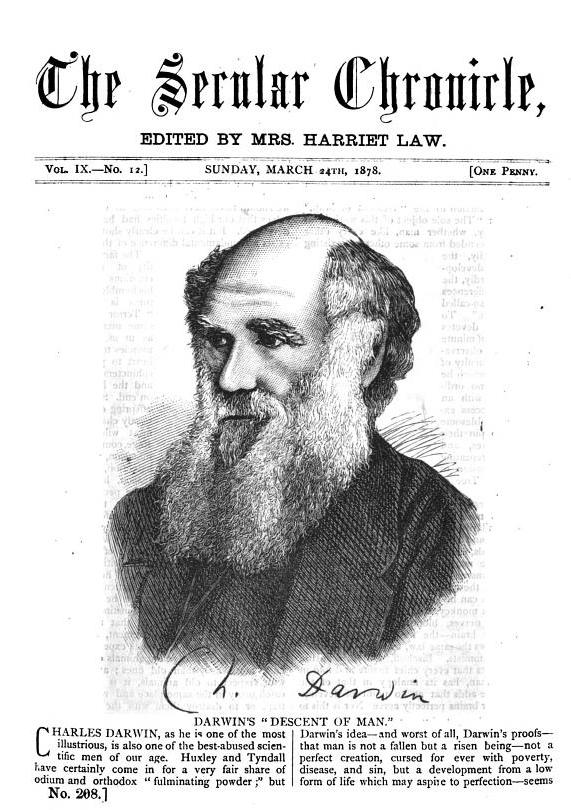
Although some of Darwin’s views would be disavowed by humanists today, not least his statements on race, his work on evolution and natural selection enabled significant development in secular and philosophical thought, lending scientific strength to humanist ideas. Many leading figures in the early Ethical movement used a greater understanding of evolution to challenge oppressive biblical teachings, and to promote the responsibility of humankind to create meaning and improve the world. Among them were feminist thinkers like Florence Dixie and Zona Vallance, who argued that a dramatically new understanding of the world required a comparatively radical rethinking of women’s role in society.
Darwin wasn’t the first evolutionist thinker, but his work on natural selection cemented his personal importance and distinctive scientific legacy. His work in evolutionary biology emphasised careful observation and comparison, as well as the evaluation of differing historical narratives as a means of explaining change over time. Following the science where it led, even where it threatened his own worldview, epitomised Darwin’s devotion to his discipline, and enabled a theory which underpins our understanding of biology – and history – today. In his own untiring rationalism and willingness to dissent from received ideas in science and theology, and the impact of evolutionary ideas on the populace at large, Darwin’s relevance to humanist heritage cannot be underestimated.

Humanism is an attitude to life that has solidly practical implications… it implies a commitment to helping run the community […]
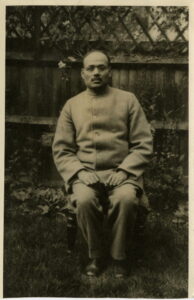
Life is a wonderful privilege. It imposes great duties. It demands the fulfilment of great tasks and the realisation of […]
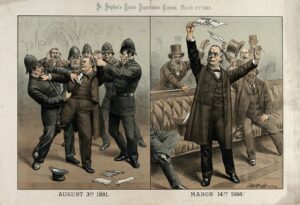
The House of Commons refused to allow his affirmation, so Bradlaugh applied to take the oath but was again refused. […]
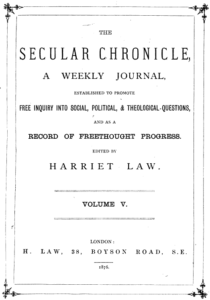
Harriet Law was a secularist and speaker, who also promoted women’s rights and socialist ideals. During the 1870s, Law’s house […]